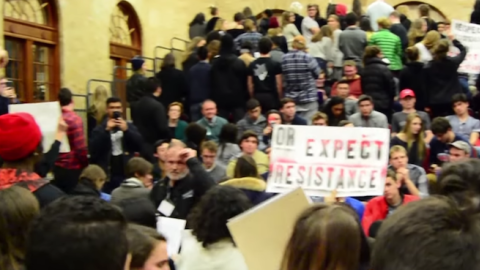On Friday, Charles Murray, author of “Coming Apart” and “The Bell Curve,” was driven out of the McCullough Student Center at Middlebury College by a mob of angry students. He gave his talk via live stream from an “undisclosed location” on campus. The live stream was chanted over, the fire alarm pulled to cut power, and at the end of the talk Charles Murray’s car was surrounded and Professor Allison Stanger, his interlocutor, was assaulted, her hair pulled and her neck injured.
The protesters were successful. They drowned out freedom of speech, silenced those with whom they disagree, and attacked the defenders of democracy.
The words that carried the night were not Murray’s. And they were not the reasoned arguments of those who disagree with Murray. They were the chants of an angry mob who believed that disagreeing with Murray necessitated silencing both him and those who had asked him to speak: “Charles Murray go away,” the students chanted, “Racist, Sexist, Anti-Gay.”
Left unanswered is the pleading question of Middlebury’s Dean of Students, Baishakhi Taylor, who asked, “How do we engage in civil discourse?” In light of events like these, we may ask ourselves — worryingly — how are we to engage in democracy?
Democracy is based upon the principle that citizens can think for themselves, choose for themselves, and vote their conscience. The tradition of free speech, freedom of the press, and freedom of assembly that we are so lucky to enjoy in America is meant to provide all Americans with the capacity to promote their views. These liberties help to protect us from tyranny no matter its form — whether the despotic rule of one or the vulgar justice of a mob.
Report from the front: The Middlebury administration was exemplary. The students were seriously scary.
— Charles Murray (@charlesmurray) March 3, 2017
Alexis de Tocqueville, one of the most astute commentators on American democracy, was no devotee of freedom of expression. “If anyone could point out an intermediate and yet tenable position between the complete independence and the entire servitude of opinion,” he writes, “I should perhaps be induced to adopt it.”
Yet, he admits, “When the right of every citizen to a share in the government of society is acknowledged, everyone must be presumed to be able to choose between the various opinions of his contemporaries and to appreciate the different facts from which these inferences to be drawn.”
Protesters who silence others by angry chants presume their fellow citizens not capable of choice — unfit for self-government. The protesters believe they should choose for their fellow students — and for their fellow citizens. They believe that affording individuals like Murray — with whom they obviously disagree — a forum in which to speak implies agreement with the individual’s views. Even those who support free speech without necessarily supporting the proffered opinions are met with derision and violence.
This is how WaPo reports on an out-of-control mob that physically assaults a speaker and a professor? https://t.co/hrGA5MfeHo
— Charles Murray (@charlesmurray) March 3, 2017
Charles Murray was invited to Middlebury by its American Enterprise Institute student club, and the event was cosponsored by the Department of Political Science. Middlebury President Laurie Patten introduced the event, saying, “I will state here that I profoundly disagree with many of Mr. Murray’s views.” She also remarked, “Middlebury students have the right to assert their views publicly and privately.”
Her position was clear. However much she disagreed with Dr. Murray’s work, she believed he had the right to speak. The students applauded her comments, but seemed to ignore her toleration of those with whom she disagreed. Cutting off Murray’s first sentence, they asserted, “These are not ideas that can be fairly debated … there is not a potential for equal exchange of ideas,” and with that they filled the halls, swarmed the stage, and shut down the discussion.
Middlebury College, home to roughly 2,500 students, is obviously just a small snapshot of American life, and the protesters represent but a fraction of Middlebury’s student body. Middlebury is renowned for providing matriculants a rich, liberal arts education. But that education is under threat — not only at Middlebury, but at colleges and universities around the country.
The riot that silenced Dr. Murray is not the only of its kind. Similar events have taken by storm UC Berkeley, NYU, and the University of Washington. Higher education is supposed to provide students with the skills to become working professionals, knowledge to help govern our nation, and wisdom to be good citizens.
Freedom of speech under attack should cause great alarm. Whether its defenders will speak up will tell us much about the state of American democracy.



















